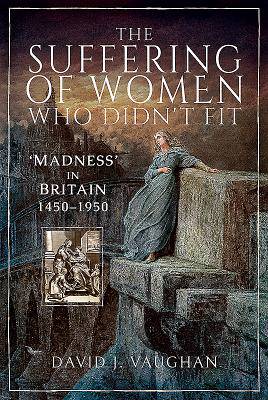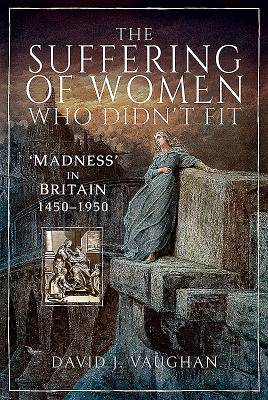
- Afhalen na 1 uur in een winkel met voorraad
- Gratis thuislevering in België vanaf € 30
- Ruim aanbod met 7 miljoen producten
- Afhalen na 1 uur in een winkel met voorraad
- Gratis thuislevering in België vanaf € 30
- Ruim aanbod met 7 miljoen producten
Zoeken
The Suffering of Women Who Didn't Fit
'Madness' in Britain, 1450-1950
David J Vaughan
Hardcover | Engels
€ 27,95
+ 55 punten
Omschrijving
For over 500 years, women have suffered claims of mental decay solely on account of their gender. Frigid, insane, not quite there, a witch in sheep's clothing, labels that have cast her as the fragile species and destroyer of Man.
This book reveals attitudes, ideas and responses on what was to be done with 'mad women' in Britain.
Journey back into the unenlightened Middle Ages to find demonic possession, turbulent humors and the wandering womb. In the Puritan Age, when the mad were called witches and scolds ducked for their nagging. The age of Austen and a sense and sensibility created from her fragile nerves. Then descend into Victorian horrors of wrongful confinement and merciless surgeons, before arriving, just half a century past, to the Viennese couch and an obligation to talk.
At the heart of her suffering lay her gynecological make-up, driving her mad every month and at every stage of her life. Terms such as menstrual madness, puerperal insanity and 'Old Maid's Insanity' poison history's pages.
An inescapable truth is now shared: that so much, if not all, was a male creation. Though not every medic was male, nor every male a fiend, misogynist thought shaped our understanding of women, set down expectations and 'corrected' the flawed.
The book exposes the agonies of life for the 'second class' gender; from misdiagnosis to brutal oppression, seen as in league with the Devil or the volatile wretch. Touching no less than six centuries, it recalls how, for a woman, being labeled as mad was much less a risk, more her inevitable burden.
This book reveals attitudes, ideas and responses on what was to be done with 'mad women' in Britain.
Journey back into the unenlightened Middle Ages to find demonic possession, turbulent humors and the wandering womb. In the Puritan Age, when the mad were called witches and scolds ducked for their nagging. The age of Austen and a sense and sensibility created from her fragile nerves. Then descend into Victorian horrors of wrongful confinement and merciless surgeons, before arriving, just half a century past, to the Viennese couch and an obligation to talk.
At the heart of her suffering lay her gynecological make-up, driving her mad every month and at every stage of her life. Terms such as menstrual madness, puerperal insanity and 'Old Maid's Insanity' poison history's pages.
An inescapable truth is now shared: that so much, if not all, was a male creation. Though not every medic was male, nor every male a fiend, misogynist thought shaped our understanding of women, set down expectations and 'corrected' the flawed.
The book exposes the agonies of life for the 'second class' gender; from misdiagnosis to brutal oppression, seen as in league with the Devil or the volatile wretch. Touching no less than six centuries, it recalls how, for a woman, being labeled as mad was much less a risk, more her inevitable burden.
Specificaties
Betrokkenen
- Auteur(s):
- Uitgeverij:
Inhoud
- Aantal bladzijden:
- 192
- Taal:
- Engels
Eigenschappen
- Productcode (EAN):
- 9781526732293
- Verschijningsdatum:
- 7/02/2019
- Uitvoering:
- Hardcover
- Formaat:
- Genaaid
- Afmetingen:
- 152 mm x 235 mm
- Gewicht:
- 521 g

Alleen bij Standaard Boekhandel
+ 55 punten op je klantenkaart van Standaard Boekhandel
Beoordelingen
We publiceren alleen reviews die voldoen aan de voorwaarden voor reviews. Bekijk onze voorwaarden voor reviews.











